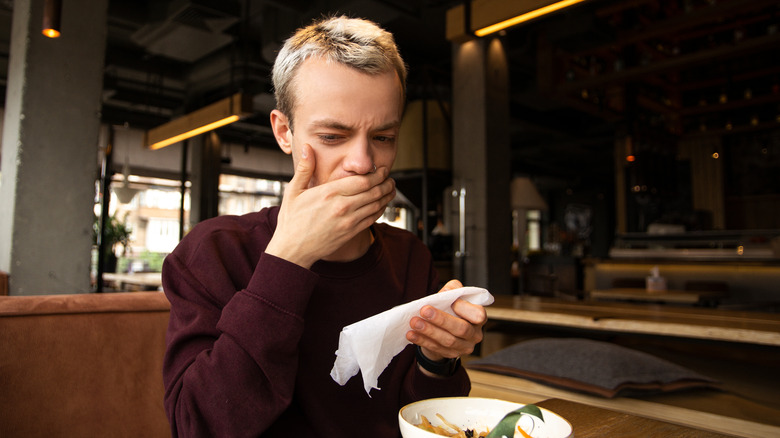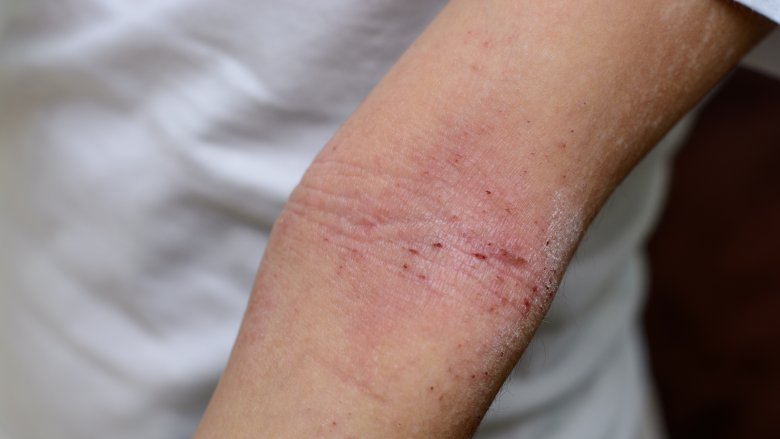Signs You May Have A Food Allergy
Chances are you or someone you know may be affected by a food allergy. "A food allergy reaction occurs when your immune system overreacts to a food or a substance in a food, identifying it as a danger and triggering a protective response," according to The American College of Allergy, Asthma and Immunology. While we may think of such allergies as something you're born with, food allergies can develop at any age.
Dr. Gina Coscia, an allergy and immunology attending physician with Northwell Health in Long Island, told The List, "People react to foods in different ways. Some people can have a true allergy, and develop symptoms 30 minutes to a few hours after eating a food, or patients can also experience intolerances where it's not a true allergy, but a particular food doesn't make them feel good." Reactions can be mild to severe — even life-threatening — and because your body may not react the same every time, most healthcare providers counsel patients to avoid triggering foods in case of a more serious reaction.
Food allergy symptoms can impact the body in numerous ways. Consider these common signs.
Tingling or itching
Itching and tingling in the mouth or throat can signal a fungal or viral infection (via Curist). However, if you notice these symptoms after eating raw fruits or vegetables, you might be dealing with oral allergy syndrome (OAS), in which the body reacts to certain foods as if they were pollen, per Medical News Today. Foods known to trigger OAS include tomatoes, mangos, kiwi, watermelon, artichokes, and oranges. OAS, itself, is not a life-threatening condition, but it can be annoying. The best way to manage it is to address underlying seasonal allergies that you may have. Another way is to par-cook your trigger foods. If you're already in the midst of a reaction, a hot drink may provide relief.
That said, itching and tingling of the mouth or throat could be a sign of a food allergy that has nothing to do with pollen sensitivity and is solely food-related, Drs. Waverly Yang and Marc Goldstein explained to Curist. If, after eating a particular food — any particular food (not just raw fruits and vegetables) — you experience itchiness or tingling of the mouth or throat, especially if accompanied by other symptoms, it's advisable to seek immediate medical attention because these are signs of a serious and potentially life-threatening allergic reaction known as anaphylaxis. Although any food allergy could trigger itching or tingling of the mouth, those most commonly associated with this symptom include soy, peanuts, tree nuts, shellfish, milk, and eggs, per Heathline.
Trouble breathing, wheezing
Whether it sets in immediately or within a few minutes or hours, breathing difficulty is a serious sign of an allergic reaction. Feeling like your throat is tight and like it's hard to draw a deep breath are also key indicators. Some people may notice they develop a cough or wheeze. Allergy and immunology attending physician Dr. Gina Coscia told The List, "Any difficulty breathing should be taken seriously. With wheezing, you might hear a high-pitched sound when you breathe or feel tightness in your chest." Seek help ASAP.
Dr. Vincent Pedre, an Institute for Functional Medicine certified practitioner, explained to The List, "A true food allergy is characterized by anaphylaxis, which can involve the swelling [and] closing of the wind pipe (trachea) and bronchospasm (spasm of the small airways in the lungs, like in asthma), leading to breathing difficulties and possibly death."
If you start turning pale or blue, that means your oxygen may be cut off. Translation: Call 911 right away.
Swelling
Oral swelling, whether or not accompanied by itching or tingling, may be a sign you're allergic to something you've eaten, according to the Mayo Clinic. Even if that swelling is minor, it's worth making a mental note of what you've just eaten because your first reaction to a particular food may produce only mild, localized swelling, whereas your next exposure to that same food could lead to a more severe reaction (via MedlinePlus). An allergic reaction that affects more than one part of the body is known as anaphylaxis, according to Icahn School of Medicine. Anaphylaxis is the most severe form of an allergic reaction, and in extreme cases, it may cause shock, loss of consciousness, and/or death.
Anaphylaxis is commonly associated with swelling, and especially, swelling of the airways; however, a clinical diagnosis of anaphylaxis requires that more than one part of the body be involved. Moreover, although anaphylactic swelling often presents immediately upon contact with a trigger food, it may be delayed by as many as one to three hours after eating a trigger food. Accordingly, if at any time within the first three hours after eating you experience swelling in any part of your body that you know is not attributable to some other cause, and that swelling is accompanied by any other symptom commonly associated with a food allergy, it's essential to seek medical attention.
Hives, rash, or eczema
Breaking out in hives? Itchy all over? It's not random! Even an eczema outbreak could be the result of a food allergy. Note if there is a particular area of the body where you get itchy or break out in hives or eczema. Not totally sure what you're looking for?
Hives, as Dr. Vincent Pedre told The List, involve "a very uncomfortable rash that appears as raised red patches on the skin." Eczema is somewhat similar, but it will appear as "a sometimes itchy rash that looks like areas of red, dry skin, which occasionally flake. It tends to occur along the inner folds of joints like the elbows, knees, fingers, [and] wrist but can happen anywhere on the body."
Dr. Gina Coscia, an allergy and immunology attending physician with Northwell Health, told The List, "Itching may show up on the chest, the arms, the abdomen — anywhere. If it's just minor itching in one part of the body that usually indicates a mild reaction, but if it's anything on your entire body or anything that involves difficulty breathing or vomiting or any sign of a systemic reaction, you should seek medical attention immediately."
Dizziness
Dizziness, difficulty balancing, disorientation, or vertigo can signify any number of health conditions, according to the Mayo Clinic. However, dizziness should be suspected as a symptom of a food allergy if it comes on while you are eating or within the first one to three hours after having eaten.
In the context of food allergies, dizziness is often listed as a symptom of anaphylaxis, a severe and potentially life-threatening allergic reaction (via Icahn School of Medicine). This is because anaphylaxis may cause your blood pressure to drop, which can induce feelings of dizziness as well as a pallor to the skin. However, dizziness alone does not signify anaphylaxis. If you suspect a food allergy is to blame, you should pay close attention to any and all symptoms you experience while or after eating.
In some cases, food allergies may even be present while exercising, according to the Mayo Clinic. This is known as exercise-induced food allergy. Like all food allergies, exercise-induced food allergies may rise to the level of anaphylaxis. So any dizziness in the context of, or after, eating, is worth a chat with your healthcare provider.
Gastrointestinal discomfort
Sometimes allergic reactions show up as gastrointestinal distress. We tend to write off these bathroom issues as a bug or food poisoning, but if you experience stomach cramps, nausea, diarrhea, or vomiting, it could indicate an allergy, according to Institute for Functional Medicine certified practitioner Dr. Vincent Pedre.
However, in some cases, Dr. Gina Coscia, explained, these symptoms may actually be related to an intolerance. "Lactose intolerance is often confused with a true milk protein allergy" because of some overlap in symptoms, she said. However, she continued, saying, "A true allergy to milk protein would involve hives, itching, shortness of breath, vomiting, or weakness and feeling like they're going to pass out."
Dietitian Linzy Ziegelbaum of LNZ Nutrition, LLC in Long Island, New York, told The List, "It's important for people to realize food allergies and food intolerances are not the same thing. While food intolerances can be uncomfortable and can make you feel horrible, food allergies can be life threatening."
Methods for identifying potential triggers
"When someone suspects they have an allergy," dietitian Linzy Ziegelbaum of LNZ Nutrition, LLC told The List, "I always recommend that they first see an allergist to screen for potential allergens. If allergy testing does not confirm a food allergy, then I recommend keeping a food journal to identify the cause of their allergy symptoms. Food journals can be helpful because it is hard to remember everything that we eat each day." But just writing down what you eat each day is only the beginning.
"It is important to include in food journals what you ate, the time you ate it, and any symptoms experienced. By keeping food journals, it makes it easier to see patterns and repeat offenders of certain foods." She recommends having a registered dietitian who's knowledgeable in food allergies and elimination diets to review your food diary and guide you on next steps. Sometimes, elimination diets may be used to help you weed out what's causing a problem.
What to expect at the allergist appointment
Once you've realized your symptoms are related to what you've been eating, it's time to schedule an appointment with an allergist. Allergy and immunology attending physician Dr. Gina Coscia said to expect a full work-up on your first visit. "If your allergist is suspicious of an allergy they'll do either skin testing or blood testing," she explained. "Based on those results, your allergist will help you figure out whether you need to avoid or those foods or not. You don't want to put yourself at risk because you need to balance the risk of a serious reaction with excessive, unnecessary elimination, risk of nutritional deficiency, and fear."
In some cases, your doctor may have you do a food challenge, where you eat the food you're potentially allergic to in the doctor's office so they can monitor your symptoms. Unfortunately, you won't be eligible for allergy shots if you're experiencing food allergies. "Allergy shots are used only for environmental allergies," Dr. Coscia confirmed. In most cases, avoiding the food or foods you're allergic to is the main line of defense.
Getting used to your new normal
Dietitian Linzy Ziegelbaum of LNZ Nutrition, LLC acknowledged that it's totally normal to feel overwhelmed when dealing with a new dietary restriction. What will you eat? Will you be able to meet your needs?
"Meeting with a registered dietitian trained in food allergies can help make the changes easier," Ziegelbaum said. "Dietitians can help with recipe substitutions and product substitutions that make it less scary to have to change your diet. These substitutions make you feel like you are still able to eat a variety of foods and enjoy recipes you did not think you would be able to enjoy again." She continued, saying, "Dietitians are also able to evaluate someone's diet and make suggestions to help them meet their nutrition needs, which can ease some of their fears and anxieties about diet change." When you feel yourself getting frustrated, she added, "Be patient, and remember that the reason for the diet is because of an allergy, and the change is necessary to help someone feel better and keep them safe!"
Dr. Coscia added, "If you've had a reaction to a food that has scared you or a loved one, it's worth investing, or if you have questions or concerns about a serious reaction you've had to a food in the past, it's important to discuss it with an allergist." If you're overwhelmed by adjusting to a new restriction, talk to someone who can help you navigate the change and help you find new things you'll love.










